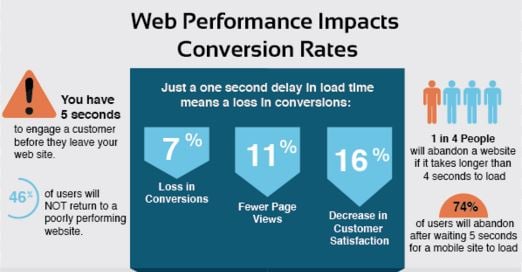If you ask any business owner what their marketing aims are, one of the first things they are likely to list is increasing the traffic to their website. So let's take a look at some cool tips, hints and website hacks from the Inbound Marketing methodology that can help you achieve more visitors.
Inbound Marketing for Increased Traffic: Blogging
Your blog is a great way of increasing your website traffic. Keeping your blog up to date with good quality content that helps your target customers will help to boost your website traffic in a number of ways.

- Blogs can help support your attempt to rank on the results pages of search engines. Imagine what questions your customers might be asking, what challenges they may face, what they may have entered into Google, looking for answers. Read up on effective keyword research before you get started.
- Use your blog as a way of answering your FAQs. Not only will you find your ranking increasing (especially if you use structured data for your FAQs) - but it will also be particularly helpful for your customers, encouraging them to click on more of your content and share it. FAQs are also a great way of allowing website visitors to qualify themselves. Beyond your own team and your customers, you can also do research on forums, community sites, and social listening tools like AnswerThePublic.
- Share your blog content far and wide. Not only through your business and its social platforms, but also through industry news sites and reputable online publications. Some great places to share your content include:
- Triberr
- Bizsugar
- Your Email List
- Niche-based Social Bookmarking sites
- Industry-Specific Social Networks
- Visual.ly
- LinkedIn Groups
Leverage Social Media for Increased Website Traffic
Using social media to promote your content is one of the best ways in which your efforts can directly improve the traffic to your website.
Social channels are a great platform for posting out compelling links to your content and building a brand personality. Building a social marketing strategy will take some effort, but here are a few pointers to get you started:
- Start connecting with your target audience by engaging with their content and their questions.
- Leverage popular and trending hashtags to reach a wider audience.
- Mention others in your posts you may have helped contribute to your blog post (anyone you have referenced)
- Consistency is key. That includes posting frequency, tone of voice, and content types.
Pinterest (don't assume it won't help) helps present your product or service in a different style; it can open up the opportunity of increased sales and exposure, all of which will link directly back to your website. Ensure you uphold SEO best practices with your Pinterest activity; Pins on this channel (the specific name for posts on Pinterest) are indexed within the site, as well as on search engines. Anything you do on Pinterest will show up on search engines, there's simply no room for sketchy SEO techniques.
LinkedIn has become much more than just a glorified CV database; it also encourages some of the most interactive group debates and has become a publishing platform in its own right.
Active engagement is easy to forget when you are busy posting and promoting your content. But by far the most effective way of succeeding on social media is through communicating - that's right, talking to people, just like social media was meant to be. So search out questions and answer them, offer solutions and be a helpful social media presence.
Paid Advertising To Boost Website Traffic
Sponsored advertising on social media networks is an obvious first port of call. But before toggling your campaigns on, carefully consider the commercial keywords you are targeting and whether your advertising will reach your target market.
- Display advertising on Twitter and Facebook (like the one below) helps expose your brand to an audience of new prospects. Social media advertising also allows for great targeting - so you're not only getting more website visitors, but those visitors will be closely representative of your ideal customer.

- PPC (Pay Per Click) can be helpful in generating visits to your website, especially while you wait for your organic content to gain traction. As long as you do your keyword research properly, you can have ready-to-buy customers lining up in a matter of hours or days. Be aware that the costs of each click add up - and although convenient and quite reliable, it won't guarantee you a sale.
Set Your Website Up for Success: Growth Driven Design
When was the last time you optimised your website? Making sure you're set up for great organic rankings is a necessity in ensuring that visitors actually find your pages, but is your website designed to convert that traffic into a lead?
- Analyse the SEO for each page because keywords are important; both long-tail and short-tail ones. Long-tail keywords account for the majority of searches, if you aren't targeting them then you are probably missing out.
- Linking to relevant external pages helps your website's SEO but also strong internal links will enhance user experience. A few well-placed and helpful internal links to your pages and blogs will contribute to longer visiting times, helping keep your visitor engaged and more likely to purchase.
- Landing pages have become the number one method of funnelling your visitors to exactly where you want them. Your forms are the defining point that encourages a visitor to convert. Help your landing pages succeed by optimising your forms for improved lead generation.
- Make sure your website is fast enough. If it isn't quick or responsive then visitors won't be hanging around for long - and Google will notice, trust us. Try our Website Grader to get your performance results as well as useful tips for improving your website's overall performance. The below image has some interesting stats on website performance and how it can impact traffic and conversion rates.

Email Is Direct Access to a Prospect's Inbox: Use it Wisely
Have you done anything useful with your email list lately? Sent them any offers, created a newsletter? Emails - a crucial part of Marketing Automations - are still one of the most effective forms of marketing, and if you're not leveraging the power of direct access to a prospect's inbox - you're decidedly missing out.
- Emailing your blog content is powerful and even the most casual of email blasts can help increase your website traffic significantly.
- Segment your email database into target groups so you can personalise your content to each persona - this ties in well with your marketing automation strategy.
Analytics Support Data-Led Decisions
Google Analytics is and always will be important. Having a keen eye on your website visitor data can reveal your most popular pages and content. The latest integration with Google Search Console and Google Analytics helps identify your best-performing content for an even more specific optimisation opportunity.
- Reveal the content, pages and queries that are bringing in visitors, meaning you can concentrate on the content that is popular.
- Who's linking? Using your analytics data is great for finding out which websites are referring to yours and offering you a way of reaching out and establishing even more links to yours.
- Keywords that work, keywords that don’t. Ensure that the keywords you have targeted are actually working for you. Accessing your analytics data can help you establish your keyword focus and on-page SEO.
Commit to Consistency
When you commit to making changes to increase your website traffic, it's important to remember that one of the key factors that impact your success is the amount of effort you put in, continually. When you implement some or all of the methods outlined above you need to continue to monitor their performance, streamline your efforts to focus on what works and leave out what doesn't, and make improvements to perfect your strategy.
The importance of more traffic to your website can be summed up in the following three statements:
No traffic = no leads.
No leads = no sales.
No sales = no business.
Having a strong Inbound Marketing strategy can ensure that all your website marketing goals are monitored and optimised, meaning you get more visitors with an incentive to use your services.




